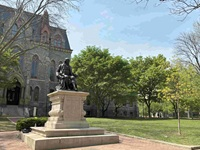Speaker
Description
Impacts from high-energy particles have been demonstrated to cause correlated errors in superconducting qubits by increasing the quasiparticle density in the Josephson junction (JJ) leads. These correlated errors are particularly harmful as they cannot be remedied via conventional error correcting codes. It was recently demonstrated that these correlated errors can be reduced or eliminated by engineering the difference in superconducting gap across the JJ to be larger than the qubit frequency. In order to test the efficacy of this strategy we have exposed arrays of this type of “gap-engineered” qubits to a variety of radioactive sources, scanning both particle type and energy deposited in the substrate. I will describe measurements utilizing an electron linear accelerator and an $^{241}$Am alpha particle source and discuss their implications for the future of preventing correlated errors.

